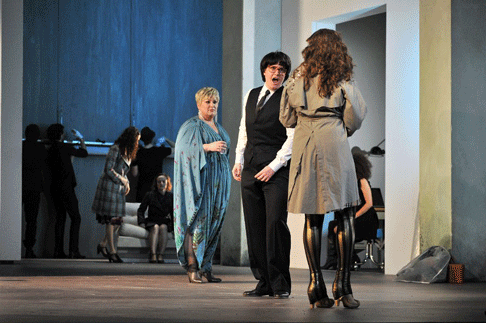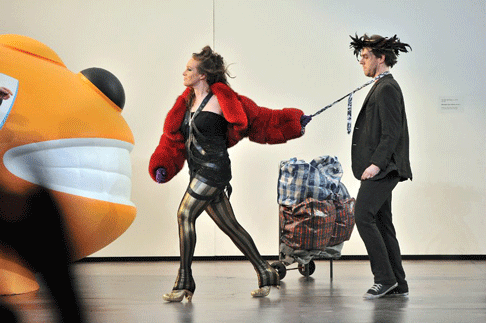![Heidi Melton as Ariadne [Photo by Frédéric Desmesure courtesy of Opéra National de Bordeaux]](http://www.operatoday.com/Ariadne_ONB_03.gif)
06 Mar 2011
Ariadne auf Naxos, Bordeaux
Ariadne on Naxos, or you could call it Bacchus á Bordeaux. It was an orgy of art.
English Touring Opera are delighted to announce a season of lyric monodramas to tour nationally from October to December. The season features music for solo singer and piano by Argento, Britten, Tippett and Shostakovich with a bold and inventive approach to making opera during social distancing.
This tenth of ten Live from London concerts was in fact a recorded live performance from California. It was no less enjoyable for that, and it was also uplifting to learn that this wasn’t in fact the ‘last’ LfL event that we will be able to enjoy, courtesy of VOCES8 and their fellow vocal ensembles (more below …).
Ever since Wigmore Hall announced their superb series of autumn concerts, all streamed live and available free of charge, I’d been looking forward to this song recital by Ian Bostridge and Imogen Cooper.
The Sixteen continues its exploration of Henry Purcell’s Welcome Songs for Charles II. As with Robert King’s pioneering Purcell series begun over thirty years ago for Hyperion, Harry Christophers is recording two Welcome Songs per disc.
Although Stile Antico’s programme article for their Live from London recital introduced their selection from the many treasures of the English Renaissance in the context of the theological debates and upheavals of the Tudor and Elizabethan years, their performance was more evocative of private chamber music than of public liturgy.
In February this year, Albanian soprano Ermonela Jaho made a highly lauded debut recital at Wigmore Hall - a concert which both celebrated Opera Rara’s 50th anniversary and honoured the career of the Italian soprano Rosina Storchio (1872-1945), the star of verismo who created the title roles in Leoncavallo’s La bohème and Zazà, Mascagni’s Lodoletta and Puccini’s Madama Butterfly.
Evidently, face masks don’t stifle appreciative “Bravo!”s. And, reducing audience numbers doesn’t lower the volume of such acclamations. For, the audience at Wigmore Hall gave soprano Elizabeth Llewellyn and pianist Simon Lepper a greatly deserved warm reception and hearty response following this lunchtime recital of late-Romantic song.
Collapsology. Or, perhaps we should use the French word ‘Collapsologie’ because this is a transdisciplinary idea pretty much advocated by a series of French theorists - and apparently, mostly French theorists. It in essence focuses on the imminent collapse of modern society and all its layers - a series of escalating crises on a global scale: environmental, economic, geopolitical, governmental; the list is extensive.
For this week’s Live from London vocal recital we moved from the home of VOCES8, St Anne and St Agnes in the City of London, to Kings Place, where The Sixteen - who have been associate artists at the venue for some time - presented a programme of music and words bound together by the theme of ‘reflection’.
'Such is your divine Disposation that both you excellently understand, and royally entertaine the Exercise of Musicke.’
Amongst an avalanche of new Mahler recordings appearing at the moment (Das Lied von der Erde seems to be the most favoured, with three) this 1991 Mahler Second from the 2nd Kassel MahlerFest is one of the more interesting releases.
‘And there was war in heaven: Michael and his angels fought against the dragon; and the dragon fought and his angels, And prevailed not; neither was their place found any more in heaven … that old serpent … Satan, which deceiveth the whole world: he was cast out into the earth, and his angels were cast out with him.’
If there is one myth, it seems believed by some people today, that probably needs shattering it is that post-war recordings or performances of Wagner operas were always of exceptional quality. This 1949 Hamburg Tristan und Isolde is one of those recordings - though quite who is to blame for its many problems takes quite some unearthing.
There was never any doubt that the fifth of the twelve Met Stars Live in Concert broadcasts was going to be a palpably intense and vivid event, as well as a musically stunning and theatrically enervating experience.
‘Love’ was the theme for this Live from London performance by Apollo5. Given the complexity and diversity of that human emotion, and Apollo5’s reputation for versatility and diverse repertoire, ranging from Renaissance choral music to jazz, from contemporary classical works to popular song, it was no surprise that their programme spanned 500 years and several musical styles.
The Academy of St Martin in the Fields have titled their autumn series of eight concerts - which are taking place at 5pm and 7.30pm on two Saturdays each month at their home venue in Trafalgar Square, and being filmed for streaming the following Thursday - ‘re:connect’.
The London Symphony Orchestra opened their Autumn 2020 season with a homage to Oliver Knussen, who died at the age of 66 in July 2018. The programme traced a national musical lineage through the twentieth century, from Britten to Knussen, on to Mark-Anthony Turnage, and entwining the LSO and Rattle too.
With the Live from London digital vocal festival entering the second half of the series, the festival’s host, VOCES8, returned to their home at St Annes and St Agnes in the City of London to present a sequence of ‘Choral Dances’ - vocal music inspired by dance, embracing diverse genres from the Renaissance madrigal to swing jazz.
Just a few unison string wriggles from the opening of Mozart’s overture to Le nozze di Figaro are enough to make any opera-lover perch on the edge of their seat, in excited anticipation of the drama in music to come, so there could be no other curtain-raiser for this Gala Concert at the Royal Opera House, the latest instalment from ‘their House’ to ‘our houses’.
"Before the ending of the day, creator of all things, we pray that, with your accustomed mercy, you may watch over us."
![Heidi Melton as Ariadne [Photo by Frédéric Desmesure courtesy of Opéra National de Bordeaux]](http://www.operatoday.com/Ariadne_ONB_03.gif)
Ariadne on Naxos, or you could call it Bacchus á Bordeaux. It was an orgy of art.
The opera’s prologue got us pretty concerned about exactly how the Strauss/von Hofmannsthal conceit (superimposing improvised comedy on high art tragedy) would play out. It was going to happen in some sort of distressed art space where some pretty bad art (a huge, plastic sculpture) had been lifted out to make space for more, we assumed, bad art (“performance art” is at least naughty if not usually bad).
But all this turned out to be a high flying artistic extravaganza. Its riches were three fold — first it is a big opera with three great roles for sopranos, second there were three great sopranos, and third Bordeaux gave the opera a mise en scène that played with its complexities and reveled in its fun.
Performance art is as close as we come these days to commedia dell’arte, so this transcription of art form was well taken, plus performance art seems to question the nature of art more than it questions anything else and this led metteur en scène Roy Rallo to probe the depths of this silly Strauss/von Hofmannsthal tragedia cum commedia and to find out that it is in fact a fairly serious artistic treatise.
The ubiquitous wreck of a cheap sofa that inhabits most performance spaces here headquartered Najade, Dryade and Echo in various prone positions while stage hands poured buckets of dirt over them, Ariadne was seated in the neon tube outlined sand box, with the remnant, a small head (remember the huge sculpture in the prologue), of a dog’s toy that was the minotaur, and Theseus too. Echo outlined the minotaur head on the ubiquitous performance space white wall during Ariadne’s lament, and later seconded the forceful horn announcements of Bacchus’ arrival with determined throws of her yoyo. More dirt was poured on Najade and Dryade.
When it was Zerbinetta’s turn in the sand box she sang her ravishing parody in nightclub garb only to be sexually ravaged by the comedians (painting her in lurid colors). When she became Harlequin’s wife in an American gothic tableau during Ariadne’s prayer we understood all too well that all this was the trappings of ordinary, everyday mortal love in contrast to the grandiose ideal of love sought by Ariadne.
Well, Bacchus arrived and we had Orpheus and Euridice all over again. In reverse. When their gaze finally met it was all over, Bacchus disappeared into the void (all the doors onto the stage burst open — out the back we even saw the building across the street) and Ariadne was left alone on the stage as the beat-up Zerbinetta with her sad Harlequin husband exited through a side door into a snow storm.
So, all this was art, but what about life? That was of course Strauss’ Composer who had a bitter artistic pill to swallow, though this young composer thought he had found a soul mate in Zerbinetta, and he poured his heart out about it, only to be first of the opera’s lovers to learn that true love is not to be had in this life. Just then there was a bonus: the Opéra National de Bordeaux enriched Strauss’ ridiculous concoction by superimposing an operatic whim of its own — real time, curtain calls onto the prologue!
 Heidi Melton as Ariadne, Elza van den Heever as The Composer and Brenda Rae as Zerbinetta
Heidi Melton as Ariadne, Elza van den Heever as The Composer and Brenda Rae as Zerbinetta
Marsha Ginsberg gave detailed design to the sets, the dirty walls and chipped tiles of a very realistic building blurring the boundaries between art and real life, and costumer Doey Lüethi further complicated this distinction with real clothing that sometimes screamed character. Lighting by Chris Akerlind cannily intermixed the real and the arty, the flashing red and green lights during the opera’s final sublime love music reminding us that all this was, said and done, performance art confusing itself with art.
Yes, it took the considerable artistry of three exquisite sopranos to pull this off. Elza van den Heever (Composer), Heidi Melton (Ariadne) and Brenda Rae (Zerbinetta) are new generation artists with beautiful, fresh and well-schooled voices that illuminate amazing histrionic depth with elegant artistry. Mlle. van den Heever literally tore up the stage in her aria. Not to mention that Zerbinetta tore up the stage as well, standing motionless for her aria, and Heidi Melton brought real gravity to the opera’s opera, sitting with her back against the wall, her legs splayed downstage, her voice lofting torrents of gorgeous tone.
 Brenda Rae as Zerbinetta and Thomas Dolié as Harlequin
Brenda Rae as Zerbinetta and Thomas Dolié as Harlequin
Conductor Kwamé Ryan drove the big moments of the opera to maximum Straussian effect, and that effect was considerable indeed, though precision and energy were wanting in the detail that Strauss lavishes on his musical story telling. This was most noticeable in the Prologue, though it is possible that this Prologue’s laxity was also the result of the heavy-handed exposition of the performance art metaphor.
The Harlequin, sung by baritone Thomas Dolié, created the evening’s most touching moments, approaching Ariadne’s sandbox with his arms outstretched during her lament, and then as Zerbinetta’s forlorn husband. The Music Master was confidently portrayed by Oliver Zwarg. Actor Martin C. Turba as the Major-domo seemed to be at odds with the musical and staging rhythms of the Prologue further deadening it. Tenor Arnold Bezuyen as Bacchus confused bellowing with singing. Najade (Mélody Loulejian), Dryade (Leslie Davis) and particularly Echo (Eve-Christophe-Fontana) brought fine singing and much pleasurable deadpan perspective to Ariadne’s suffering.
Michael Milenski